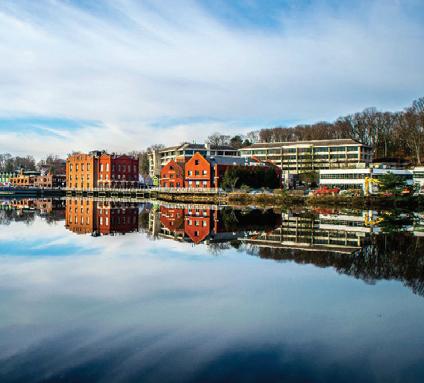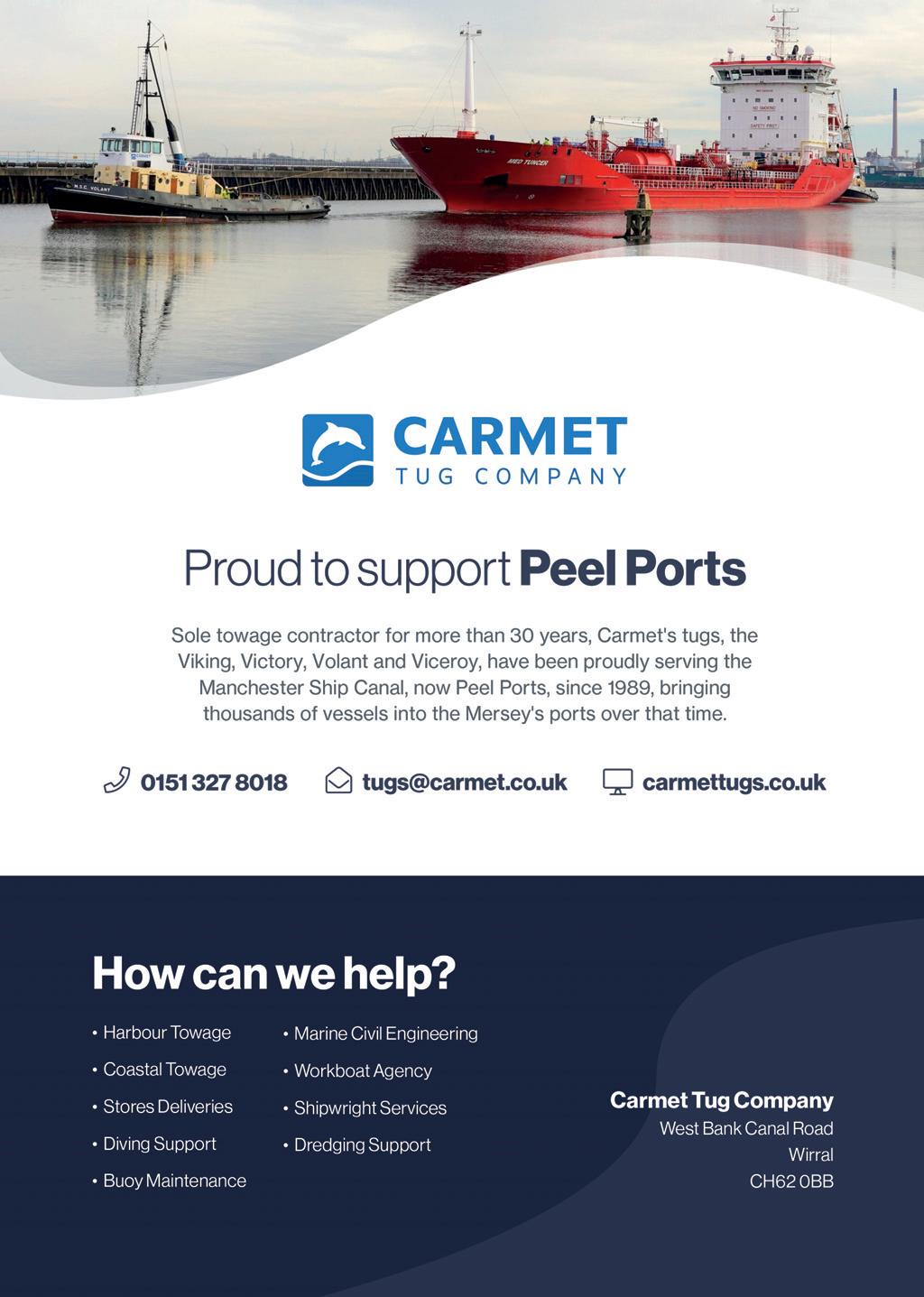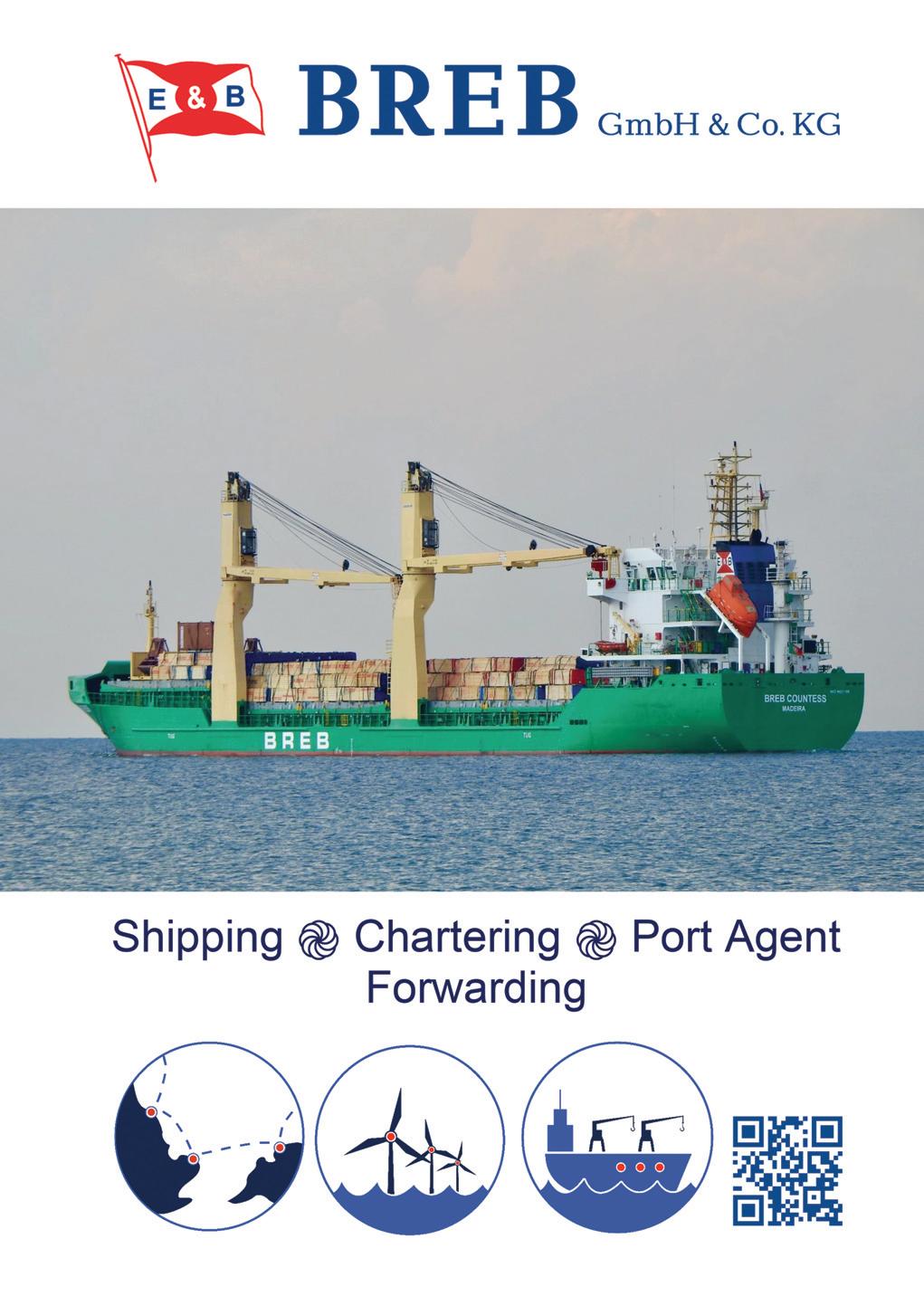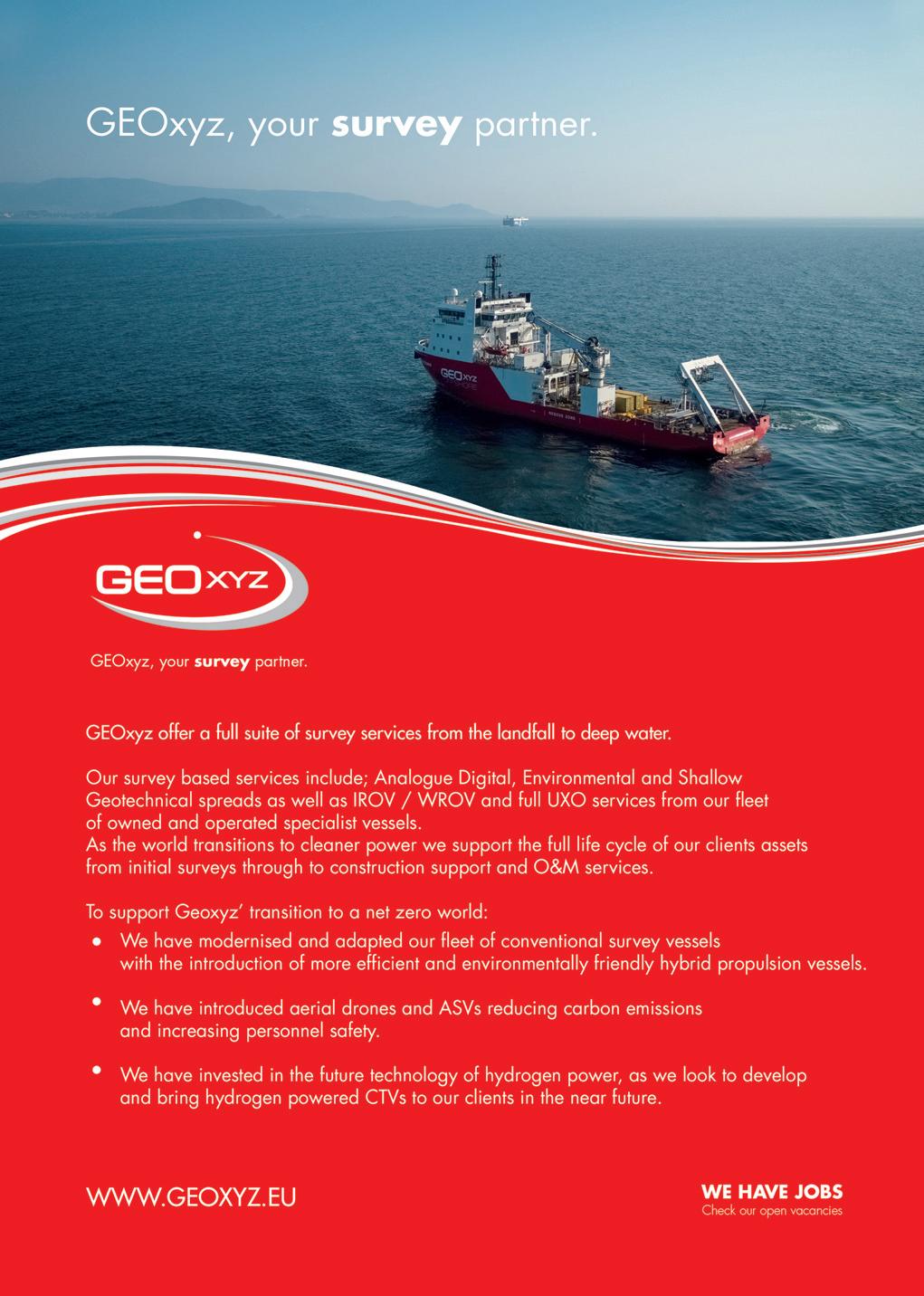
10 minute read
Marine news in brief
Latest news in the marine industry
MSC accelerates its digital transformation using Marlink solutions
Advertisement
Smart network company Marlink is partnering with MSC, the world’s largest container shipping line, to support the shipping company’s ambitious digitalisation goals, using Marlink’s hybrid network solutions and advanced, secure IT management.
Marlink deploys a fully managed hybrid network solution, bundling its VSAT connectivity with L-band backup and global 4G connectivity on 127 vessels, providing MSC with seamless, secure connectivity to run its critical business and crew applications. This hybrid network solution is fully secured by Marlink’s Cyber Detection Service which scans real-time outbound and inbound network traffic for targeted cyber threats and takes immediate countermeasures to remediate incidents. In this way the shipping giant can keep its remote vessels securely connected.
The next phase of MSC’s digitalisation strategy sees the roll-out of Marlink’s ITLink management solution across the fleet. MSC has moved decisively to increase the standardisation of its onboard IT systems and to meet 2021 IMO requirements, enabling fleet managers to monitor operating IT systems and software from shore. ITLink enables MSC fleet managers to remotely access their onboard IT networks for monitoring and troubleshooting in a secure environment and allows software updates and patches to be applied fleetwide – a major efficiency gain for container shipping’s leader.
“Marlink understands the critical requirements that drive container lines; operating a global service with high attention to asset availability, service reliability and security that demand a global approach,” said Nicolas Furgé, President, Digital, Marlink. “Our partnership with MSC will enable them to build a digital ecosystem that supports efficient vessel operations and compliance, powered by world-class connectivity.”
Ammonia Prepared class notation for Geogas LPG carriers ordered at HMD Marlink solutions
Class society Bureau Veritas has announced it is supporting the classification and construction at Hyundai Mipo Dockyard (HMD) in the Republic of Korea of two 40,000 cbm LPG carriers that will be ‘ammonia prepared’. The HMD hull numbers are 8350 and 8351 and the first delivery will be in June 2023. “It’s great to confirm this project for the first ships that will receive our Ammonia Prepared notation,” said Ulrik Dan Frorup, Chief Commercial Director, Bureau Veritas M&O. “BV was among the first class societies to develop such classification rules for future installation/conversion of ammonia propulsion. The expertise that we have developed in risk methodology and our track record in LNG as a marine fuel has supported our ability to develop these rules for new low carbon fuels like ammonia.”
He added: “Ammonia presents specific safety issues related to its toxicity that have to be addressed. The industry leadership we have shown in multi-stakeholder hazard identification (HAZID) and hazard operations (HAZOP) projects has supported the development of our rules and notations for ammonia as fuel.”
The new Ammonia-Prepared notation is applicable to newbuildings, and was developed to support ship owners, designers, shipyards and charterers. Ammonia-Prepared certifies that a ship has been designed and constructed to be converted at a later date to use ammonia as fuel. The notation targets the spaces and structural components that will accommodate future ammonia fuel tanks, fuel handling equipment and ammonia vapor treatment installations. Ammonia Prepared also covers specific requirements for the conversion of engines and boilers from using fuel oil, LNG or multiple fuels to ammonia.
Mark Etcheberry, General Director at Geogas, said: “LPG carriers are frequently used to carry ammonia. From a technical point of view this makes the design suitable to be prepared to burn ammonia as a fuel. At Geogas we are committed in our ESG objectives to promote greener propulsion technologies that are technically feasible. LPG, LNG and ammonia gas fuels support these objectives.” Bureau Veritas has also developed new rules for ammonia fuelled ships designed to be applied to newbuildings that will use ammonia as a fuel from delivery. BV Rule Note NR 671 for ammonia as fuel addresses the safety aspects of managing ammonia in storage tanks, fuel-piping systems and during bunkering. NR 671 was published in its earliest form on July 1st, 2021 along with the requirements for the Ammonia Prepared notation.
iM inside(( MARINE Send us your news
We welcome all your important updates and company news. If you wish for us to share your press releases with our readers please send it to us today. Send to: media@insidemarine.com

TotalEnergies Marine Fuels completes first marine bio-VLSFO bunker delivery in SingaporeMarlink solutions
TotalEnergies Marine Fuels has carried out its first marine bioVLSFO (Very Low Sulfur Fuel Oil) bunker delivery in Singapore’s port waters, as part of a biofuel trial recently completed by NYK Line and Anglo American.
During the operation, a B10 biofuel blend that composed of VLSFO blended with 10% second-generation, waste-based and ISCC-certified UCOME (Used Cooking Oil Methyl Ester) was supplied via ship-to-ship transfer to MT Friendship, a bulk carrier owned by Seanergy Maritime Holdings and chartered by NYK Line to transport cargo provided by Anglo American. The biofuel was consumed during her two-way voyage between Singapore and Saldanha Bay, South Africa.
The UCOME bio-component, sourced from the circular economy, can achieve more than 80% reduction of GHG (Greenhouse Gas) emissions compared with heavy fuel oil from a well-to-wake analysis. Consequently, the delivered B10 biofuel blend provides a reduction of up to 10% in GHG emissions. The trial also showed that the biofuel can be safely used in relevant marine applications without any modifications.
According to TotalEnergies Marine Fuel, these results, coupled with the vessel’s smooth operational performance throughout the trial, demonstrate the potential of biofuels in assisting ship owners to meet the IMO’s carbon emissions reduction targets.
TotalEnergies Marine Fuel’s successful biofuel delivery also underlines its pioneering efforts in setting up a local biofuel supply chain for this trial, including land storage, blending and the eventual bunkering operation. The local operation was made possible with support from the Maritime and Port Authority of Singapore (MPA) and the involvement of local partners, including Singapore bunker barging company V-Bunkers and tank storage company Vopak Terminals Singapore at Penjuru.
This biofuel delivery forms part of TotalEnergies Marine Fuels’ drive to develop a range of fuel solutions to help the shipping industry’s move towards decarbonisation.
“We are delighted to partner with NYK Line and Anglo American for our first marine biofuel delivery in Singapore. This trial has allowed us to initiate the structuring of a supply chain with local expertise to create a sustainable, cost-efficient and low-carbon biofuel offer for the shipping sector in the region,” said Laura Ong, General Manager of Trading and Operations for Asia Pacific, TotalEnergies Marine Fuels, based in Singapore. “We will continue to conduct more bespoke trials with our customers and to ultimately provide a scalable solution of this lower-carbon marine fuel.”
TotalEnergies Marine Fuels is TotalEnergies’ dedicated business unit in charge of worldwide bunkering activities, serving more than 200 shipping customers across over 120 ports in Europe, Asia Pacific and Africa.
New strategic alliance developing Japan’s first methanol-fuelled domestic tanker
Six companies have formed a strategic alliance aimed at reducing environmental impact through the development of methanol-fuelled domestic tanker.
Mitsui OSK Lines, MOL Coastal Shipping, Tabuchi Kaiun, Niihama Kaiun, Murakami Hide Shipbuilding, and The Hanshin Diesel Works will collaborate to build the new tanker, which the companies claim will be the first of its kind in Japan.
The vessel development project, which targets delivery of the ship in 2024, was also selected to receive public funding through the Japanese Ministry of Economy, Trade and Industry (METI) and a Ministry of Land, Infrastructure, Transport and Tourism (MLIT) subsidy.
Methanol can reduce emissions of sulphur oxide (SOx) by up to 99%, particulate matter (PM) by up to 95%, nitrogen oxide (NOx) by up to 80%, and carbon dioxide (CO2) by up to 15%, compared to vessels using conventional fuel oil, which is currently the main fuel for marine vessels. Methanol has outstanding properties for use as a fuel, as it is liquid at normal temperatures and normal air pressure.
Methanol fuel has been more widely introduced on ocean-going vessels as an environmentally friendly fuel, including four MOL Group-operated ships, but this will be the first methanol-fuelled domestic ship. In addition, methanol can be produced with CO2 and hydrogen as raw material, so in the future, it can be produced by utilising the CO2 capture and transport business to synthesise hydrogen, which uses electricity derived from renewable resources such as offshore wind power and wave power.
If this methanol can be used as fuel, it can establish an environmental circulation type business model, enabling a reduction in net CO2 emissions. The six alliance partners will each orchestrate their advantages in technology, expertise, and networks aiming to realise a decarbonised society.
Latest news in the marine industry
VARD orders BWTS for six more marine robotic vessels

Shipbuilding group VARD has awarded Norwegian Greentech a contract to deliver the ballast water treatment systems (BWTS) to six marine robotic vessels that will be built at Vard Vung Tau in Vietnam for an undisclosed shipowner.
VARD has designed a unique multi-purpose platform that allows for onshore remote control, light crewed or uncrewed operations. The vessels are of VARD 9 60 design. VARD has designed the vessels for an ultra-low carbon footprint, and they are among the first vessels to be prepared for green ammonia and fuel cell and battery technology.
Norwegian Greentech will deliver its energy efficient BWTS to each of the six newbuild marine robotic vessels. The company has developed a method of utilising UV and filters. The chemical-free system has a highly compact design, which , according to Norwegian Greentech, is ideal for difficult-to-fit engine or pump rooms.
“VARD is constantly challenging the supplier industry to provide solutions and products that lower energy consumption, CO2 emissions, operating expenditure and the overall environmental footprint. We are very pleased about this development as it contributes towards creating even better awareness of the various BWTS features that are available in the market,” said Jon Olav Kopperstad, Senior Sales Manager at Norwegian Greentech.
In December 2021, Norwegian Greentech announced that it had secured a contract to deliver the BWTS to eight marine robotic vessels that VARD is building at Vard Vung Tau.
“First eight vessels and now another six. Our deliveries to the first batch of vessels are well advanced, and the next six BWTS systems will be identical to the first eight, contributing towards streamlining and de-risking the entire shipbuilding process,” added Mr Kopperstad.
Norwegian Greentech will manufacture the ballast water treatment systems at its headquarters in Fosnavåg, Norway, and deliver them to VARD’s shipyard Vard Vung Tau in Vietnam. Norwegian Greentech has not disclosed the value of the contract.
Norwegian Greentech is a subsidiary of HAV Group ASA, which is listed on Euronext Growth in Oslo, Norway.
GAC Bunker Fuels opens new office in Westport
GAC Bunker Fuels has opened a new office in Westport, Connecticut, USA, as part of its commitment to global customers seeking ways to decarbonise in American ports and beyond. The office will be manned by LNG, biofuel, LSFO and MGO experts Maurice Lara and John Lindquist, and will be carbon neutral given GAC Bunker Fuels’ blue carbon projects around the GAC world.
Beyond aligning with the United Nation’s Sustainable Development Goals, GAC Bunker Fuels has pledged zero oil-based bunker sales by 1st January 2030. On 1st September 2020, it stemmed the first marine LNG for a foreign-flagged vessel in the United States and is working with US-based energy utility company Puget Sound Energy to establish LNG bunkering along the US West Coast.
Maurice Lara, GAC Bunker Fuels Trading Manager for the Americas, said: “We want to help our customers decarbonise by offering alternative fuel and are uniquely positioned to do so due to our many established customer and supplier relationships. We are looking for biofuel specialists to join our expanding team to meet their growing needs.”
Joining the new Westport office are members from GAC North America’s team, who in partnership with GAC Bunker Fuels, are promoting their range of shipping services to customers in the Tri-State area with a specific focus on servicing the growing offshore wind sector along the Eastern Seaboard of the US.
GAC is a global provider of integrated shipping, logistics and marine services. Established since 1956, the privatelyowned group employs around 8,000 people in more than 300 offices worldwide.














